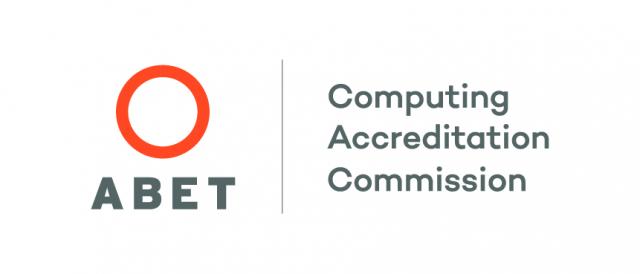ABET Accreditation
Both the B.S. Computer Science program and the B.S. Information Technology program at Kean are accredited by the Computing Accreditation Commission of ABET, the global accreditor of college and university programs in applied and natural science, computing, engineering, and engineering technology.

ABET is a nonprofit, non-governmental organization recognized by the Council for Higher Education Accreditation, which serves the public through the promotion and advancement of education in applied science, computing, engineering, and technology. It currently accredits 3,709 programs at over 750 colleges and universities in 30 countries. Each ABET-accredited program must publicly post the current annual student enrollment and graduation data per program.
Data is provided by the Office of Institutional Research and Effectiveness.
Program Educational Objectives and Student Outcomes
Program Educational Objectives for Computer Science and Information Technology students
The Program Educational Objectives for Computer Science and Information Technology are that five to seven years after graduations, students who major in Computer Science or Information Technology will become successful professionals who:
KU 1. Think critically, creatively and globally;
KU 2. Adapt to changing social, economic, and technological environments;
KU 3. Serve as active and contributing members of their communities; and
KU 4. Advance their knowledge in the traditional disciplines (GE) and enhance their skills in the professional area of Computer Science and Information Technology.
Student Outcomes
What are you learning? How does it fit together? Listed here are the Student Outcomes (SOs) for the School of Computer Science and Technology, by degree. Each course in our curriculum is designed to contribute to one or more of the SOs for the degree you are seeking. Yes, we have a plan for you!
Bachelor of Science in Computer Science
Graduates of our B.S. Computer Science program will have an ability to:
SO1: Analyze a complex computing problem and to apply principles of computing and other relevant disciplines to identify solutions.
SO2: Design, implement, and evaluate a computing-based solution to meet a given set of computing requirements in the context of the program's discipline.
SO3: Communicate effectively in a variety of professional contexts.
SO4: Recognize professional responsibilities and make informed judgments in computing practices based on legal and ethical principles.
SO5: Function effectively as a member or leader of a team engaged in activities appropriate to the program's discipline.
SO6: Apply computer science theory and software development fundamentals to produce computing-based solutions. [CS]
Bachelor of Science in Information Technology
Graduates of our B.S. Information Technology program will have an ability to:
SO1: Analyze a complex computing problem and to apply principles of computing and other relevant disciplines to identify solutions.
SO2: Design, implement, and evaluate a computing-based solution to meet a given set of computing requirements in the context of the program's discipline.
SO3: Communicate effectively in a variety of professional contexts.
SO4: Recognize professional responsibilities and make informed judgments in computing practices based on legal and ethical principles.
SO5: Function effectively as a member or leader of a team engaged in activities appropriate to the program's discipline.
SO6: Identify and analyze user needs and to take them into account in the selection, creation, integration, evaluation, and administration of computing-based systems. [IT]
M.S. in Computer Information Systems
Graduates of our M.S. Computer Information Systems program will have an ability to:
SO1: Analyze a complex computing problem and to apply principles of computing and other relevant disciplines to identify solutions.
SO2: Design, implement, and evaluate a computing-based solution to meet a given set of computing requirements in the context of the program's discipline.
SO3: Communicate effectively in a variety of professional contexts.
SO4: Recognize professional responsibilities and make informed judgments in computing practices based on legal and ethical principles.
SO5: Function effectively as a member or leader of a team engaged in activities appropriate to the program's discipline.
SO 6: Integrate computer science theories and best practices for research on issues in human society.
Undergraduate Students By Program
| Fall 2019 | Fall 2020 | Fall 2021 | Fall 2022 | Fall 2023 | Fall 2024 | |
|---|---|---|---|---|---|---|
| Computer Science | 431 | 455 | 381 | 488 | 600 | 677 |
| Information Technology | 229 | 221 | 216 | 219 | 235 | 240 |
| Total | 660 | 676 | 597 | 707 | 835 | 917 |
Undergraduate Student Graduates By Program
| Fall 2019 | Fall 2020 | Fall 2021 | Fall 2022 | Fall 2023 | Fall 2024 | |
|---|---|---|---|---|---|---|
| Computer Science | 39 | 51 | 58 | 56 | 55 | 89 |
| Information Technology | 38 | 39 | 53 | 70 | 56 | 55 |
| Total | 77 | 90 | 111 | 126 | 111 | 144 |
Information regarding ABET accreditation may be directed to:
ABET
415 North Charles Street
Baltimore, MD 21201
410.347.7700
Website: ABET